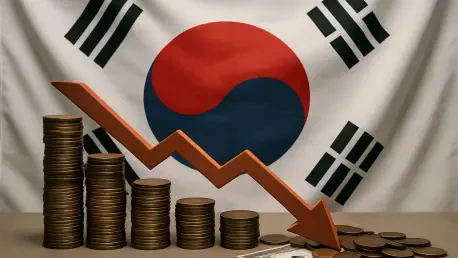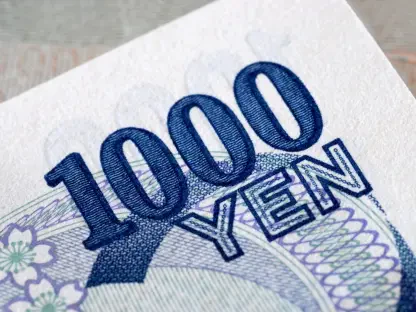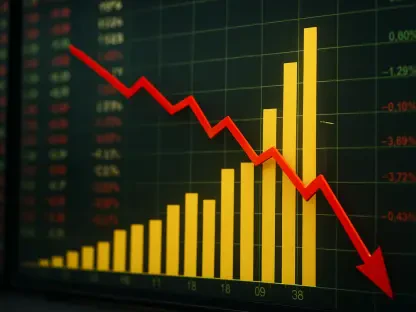South Korea finds itself at a precarious crossroads as trade tensions with the United States intensify, raising alarms about a potential financial crisis that could echo the devastating 1997 Asian economic meltdown. Government officials in Seoul have expressed deep concern over a staggering $350 billion cash transfer demanded by the U.S., a condition tied to tariff relief on South Korean exports. This ultimatum, coupled with stipulations for control over fund allocation, has sparked fears of severe economic strain. President Lee Jae-Myung has drawn stark parallels to the late 1990s, when South Korea required an emergency bailout from the International Monetary Fund (IMF) to survive a collapse. The current situation poses not just a financial challenge but a test of diplomatic resilience, as the nation grapples with balancing economic stability against mounting external pressures. These developments signal a critical juncture for South Korea, with implications that could ripple through global markets if unresolved.
Economic Risks and Vulnerabilities
Financial Strain from U.S. Demands
The heart of South Korea’s economic anxiety lies in the unprecedented scale of the financial commitment demanded by the United States. A $350 billion transfer, if executed without safeguards, risks depleting the nation’s foreign reserves and destabilizing its currency, the won. Unlike Japan, which benefits from a permanent currency swap line with the U.S. and holds larger reserves, South Korea lacks such a safety net, heightening its vulnerability to market shocks. President Lee has highlighted how this absence of a protective mechanism could exacerbate financial pressures, especially if capital outflows intensify under the weight of looming tariffs. Analysts in Seoul warn that even the perception of economic weakness could deter foreign investment, creating a vicious cycle of declining confidence and reduced growth. The potential for such a large withdrawal to unsettle markets underscores the urgency of negotiating terms that shield South Korea from catastrophic consequences.
Impact on Exports and Market Confidence
Beyond the immediate financial burden, the broader implications for South Korea’s export-driven economy are equally troubling. Exports, a cornerstone of national prosperity, face significant threats from both the proposed tariffs and the uncertainty surrounding investment rules with the U.S. Businesses in Seoul are increasingly vocal about the chilling effect of these trade disputes, noting that prolonged delays in reaching an agreement could stifle key industries like technology and automotive manufacturing. The fear of a weakened won adds another layer of complexity, as currency depreciation could inflate import costs and squeeze profit margins for exporters. Market confidence, already fragile amid global economic headwinds, hangs in the balance as investors weigh the risks of instability. South Korean officials are pushing for guarantees on commercially viable projects to mitigate these dangers, recognizing that sustained economic growth depends on maintaining trust among domestic and international stakeholders.
Geopolitical and Diplomatic Challenges
Strained Bilateral Relations
Tensions between South Korea and the United States extend beyond trade, with recent events casting a shadow over their longstanding alliance. A notable incident involving the detention of over 300 South Korean workers at a Hyundai battery plant in Georgia by U.S. immigration authorities has ignited public outrage in Seoul. While President Lee acknowledged a gesture of clemency from U.S. leadership and sought to minimize the perceived intent behind the raid, the episode has undeniably eroded trust among South Koreans. This erosion of confidence threatens to complicate future investments in the U.S., as companies question the reliability of bilateral cooperation. Public sentiment, already strained by economic concerns, now grapples with doubts about the strength of the partnership, making it imperative for both nations to address these grievances swiftly. The incident serves as a reminder that economic disputes cannot be isolated from broader diplomatic relations, which are critical to mutual prosperity.
Security Concerns Amid Global Tensions
Compounding South Korea’s challenges are escalating geopolitical risks that intersect with its economic woes. President Lee has described the growing cooperation among China, Russia, and North Korea as a dangerous development, positioning Seoul at the forefront of a clash between authoritarian and democratic forces. This heightened security threat adds urgency to maintaining a stable economic foundation, as resources may need to be diverted to defense and regional stability efforts. Without a resolution to the trade dispute, South Korea’s ability to address these external pressures could be severely hampered, leaving it exposed on multiple fronts. The upcoming trip by President Lee to New York for the United Nations General Assembly, where he will chair a Security Council meeting, underscores the need to weave economic and security priorities into a cohesive strategy. Although trade talks may not be formally on the agenda, the backdrop of global tensions will undoubtedly shape discussions, highlighting the intricate balance Seoul must strike.
Pathways to Stability
Negotiating Protective Measures
Reflecting on the past, South Korean officials and analysts reached a consensus that swift action was essential to avert the looming financial risks tied to U.S. trade demands. The government has advocated tirelessly for protective measures, such as establishing a currency swap line agreement with the U.S. to buffer against fluctuations in the won. Additionally, there is a strong push for assurances that funded projects will remain commercially viable, ensuring that the massive financial commitment does not become a sunk cost. These negotiations, though challenging, are seen as a lifeline to preserve market stability and prevent the kind of capital outflows that plagued the nation during the 1997 crisis. The emphasis on safeguards reflects a pragmatic approach, acknowledging that while the alliance with the U.S. remains vital, South Korea must prioritize its economic sovereignty. This focus on actionable solutions provides a roadmap for mitigating immediate threats while laying the groundwork for long-term resilience.
Building a Resilient Future
Looking back, the multifaceted nature of the crisis demanded a forward-thinking response, and South Korea took steps to address not just economic but also diplomatic and security challenges. A key takeaway from the tense period was the importance of diversifying economic partnerships to reduce reliance on any single nation, thereby cushioning against future trade shocks. Strengthening domestic industries and boosting foreign reserves emerged as critical strategies to weather potential storms. On the diplomatic front, rebuilding public trust through transparent communication about bilateral agreements became a priority, ensuring that incidents like the worker detentions do not derail progress. Moving forward, fostering dialogue with the U.S. to align on shared security goals, especially in light of regional threats, offers a path to reinforce the alliance. These efforts, initiated in response to the crisis, aim to position South Korea as a more robust player on the global stage, capable of navigating complex challenges with confidence and foresight.









